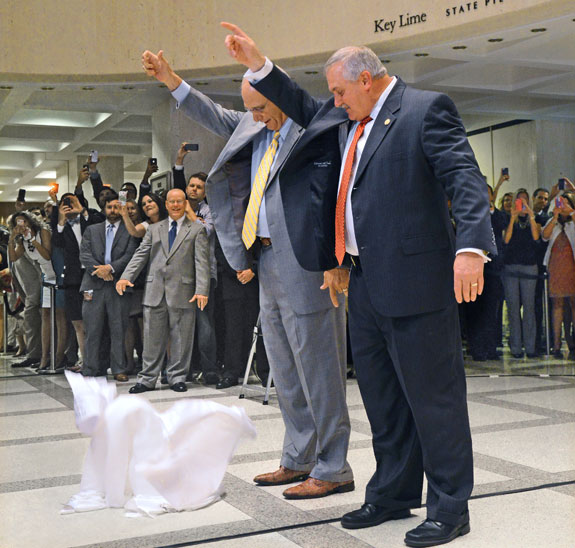
House Sergeant-at-Arms Earnest W. “Earnie” Sumner and Senate Sergeant-at-Arms Donald Severance, right, drop the traditional handkerchiefs signalling the closing session of the Legislature on May 3. The Florida Legislature did not pass a bill to expand Medicaid coverage to about 1 million low-income residents. (Photo courtesy of the Florida Legislature.)
By Ashley Lopez
Florida Center for Investigative Reporting
Medicaid expansion remains at a standstill in Florida as conservative Republican lawmakers in the state vow not to accept federal funds.
There was some movement in the state Senate to create a plan that some moderate Republicans could support. However, lawmakers were unable to reach a deal this past Legislative session over what to do with the millions of dollars the state is supposed to receive in order to provide health insurance to about 1 million low-income residents.
Gov. Rick Scott, who supports accepting the federal funds and expanding Medicaid, has not committed to calling a special session so that lawmakers can reach a deal.
A similar situation is playing out in conservative states around the country. Many states face losing out on health care money as their state lawmakers hold their ground. However, advocates across the country are coming up with a plan to bypass their Republican lawmakers — a ballot initiative.
Advocates are weighing a measure for the 2014 ballot that would allow voters to decide whether to approve the Medicaid expansion money.
In Florida, advocates have said this idea is “on the table,” Politico reported today.
Some of the Medicaid proponents hope that the prospect of a ballot initiative could spur stalemated legislatures to grind out a compromise. But if not, they’ll look to actually getting it on the ballot.
“Absent leadership there, we would have to support letting voters decide,” said a spokesman for Sen. Bill Nelson (D-Fla.), days after Medicaid expansion talks in his state’s Legislature collapsed and lawmakers adjourned for the year. Nelson and other Democrats want Gov. Rick Scott to call a special session to revisit Medicaid expansion, but Scott hasn’t shown any interest.
Jose Suarez, a spokesman for Florida’s chapter of Service Employees International Union 1199, said activists would consider several options but a ballot initiative is “something you can’t take off the table.”
Families USA, a key supporter of the president’s health law, still prefers that state lawmakers find a way of moving ahead. But Executive Director Ron Pollack said if interest groups do mobilize behind ballot efforts, Families would lend its support.
“We are not, at this juncture, promoting it,” he said. “But if this becomes a more significant discussion item among colleagues and allies, we will participate.”
While it is not unlikely that Florida voters — a majority of whom supported President Barack Obama in 2008 and 2012 — will vote to accept the federal money, there are a number of drawbacks to creating a ballot measure campaign.
Chief among them, ballot measure campaigns take a lot of time and money. In Florida, a campaign must collect almost 800,000 signatures in just a few months in order to qualify for the 2014 ballot. That would require hundreds of staffers and volunteers working to collect signatures from around the state.
In recent years in Florida, it has also become significantly more difficult to place a citizen-led initiative on a ballot. For example, Florida’s 2012 ballot included 11 ballot measures — and not a single one was from a citizen-led initiative.
That’s why it is typically easier to get work like this done through the state Legislature.
Lastly, as Politico points out, even if advocates do manage to get a ballot measure passed in November 2014, the “expansion couldn’t start until 2015 at the earliest and states would miss out on the first year of full federal funding.”
